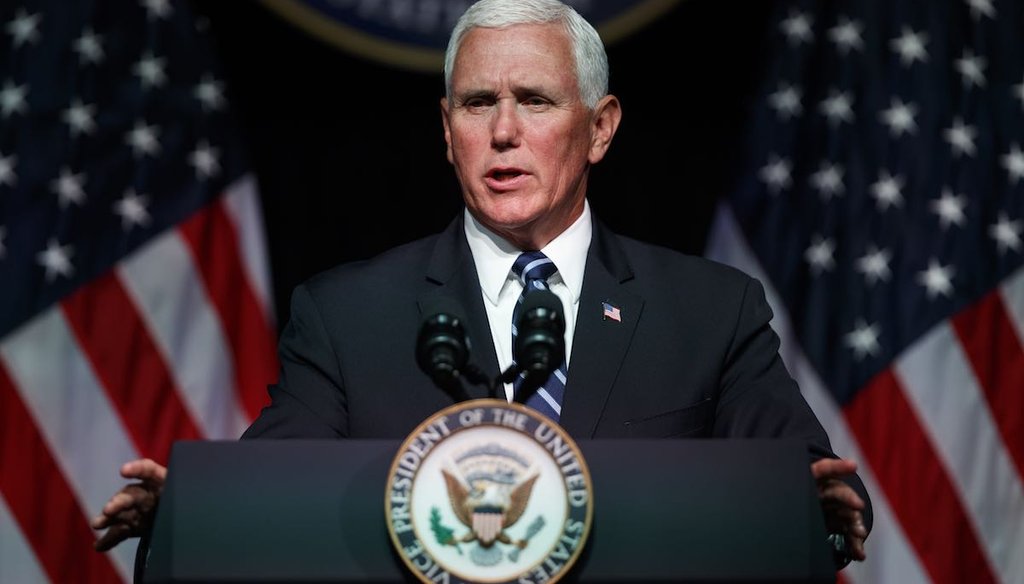Stand up for the facts!
Our only agenda is to publish the truth so you can be an informed participant in democracy.
We need your help.
I would like to contribute

Vice President Mike Pence announces the creation of the Space Force at the Pentagon on Aug. 9, 2018.
President Donald Trump is moving ahead on the Space Force.
Vice President Mike Pence laid out plans for a sixth military branch during an Aug. 9 speech at the Pentagon. Pence says the administration hopes to have Space Force operational by 2020.
"As President Trump has said, in his words, it is not enough to merely have an American presence in space — we must have American dominance in space. And so we will," Pence said. "Space is, in his words, a war-fighting domain just like land and air and sea."
The idea of a galactic military branch certainly has been a topic of much speculation, so we took a closer look. Experts told us the space force is probably not as exciting or likely to exist as the Trump team makes it sound.
"People hear Space Force and think of soldiers up in space. That’s not going to happen," Laura Grego, senior scientist at the Union of Concerned Scientists’ Global Security Program, told us. "We just don’t have dedicated weapons, and we’re not shooting at each other. It’s in everyone’s self interest to keep it unpolluted."
Sign up for PolitiFact texts
"While it’s fun to joke about Star Wars and fighting aliens, the reality is that a space ‘warfighter’ sits in a windowless control room staring at computer monitors all day," said Todd Harrison, director of the Aerospace Security Project and the director of Defense Budget Analysis at the Center for Strategic and International Studies.
The military has had a space component for several decades. Like civilians, the U.S. military relies largely on satellites to function. The Global Positioning System allows geographic coordination of forces, weather satellites allow for planning, communication satellites link troops, and reconnaissance satellites allow targeting.
Besides keeping those running, the military’s mission is to ensure their protection and figure out how to leverage American military capabilities as Russia and China build on their own satellite systems.
Space-related activities are fragmented across the Air Force, Navy, Army, and intelligence agencies. The Air Force has about 90 percent of the unclassified space budget, but the intelligence agencies have most of the classified funding, which is substantial, Harrison said.
Trump wants the United States to dominate. But it already dominates in terms of spending, number of assets, technology advancement, said Joan Johnson-Freese, a professor of national security at the Naval War College.
The sixth military branch would essentially regroup those military activities. It could allow space to get greater attention and funding, as well as address the sometimes poor coordination among the separate space programs, experts told us.
"There is not necessarily going to be an immediate transformation of capabilities in a new space force," said Bleddyn Bower, a defense studies professor specializing in space at the University of Leicester. "They'll have a busy enough time reorganizing the existing military space architecture into a new command structure for a while."
Pence announced an interim "space operations force," an inventory of all the people and organizations in the Defense Department that currently do space-related work to determine who will ultimately transfer into the Space Force. He also announced a new civilian position called the Assistant Secretary of Defense for Space that will oversee this work until the Space Force is created and there is a Secretary of the Space Force.
According to Bowen, the idea of a separate space service has dogged the Air Force since the 1950s, prompting Thomas D. White, a former Air Force chief of staff, to coin the term aerospace in the late 1950s to make people think that space was their natural domain.
There isn’t much precedent for establishing a new military branch; the last (and only other) time a new military service has been created was in 1947 when the Air Force was spun off from the Army. Experts told us Congress needs to enact legislation to formally create a Space Force.
Pence’s report said it would create a legislative proposal for Congress in the 2020 budget cycle.
Our Sources
CBS News, Trump at space event: "The U.S. will not be a migrant camp", June 18, 2018
Phone interview with Laura Grego, senior scientist at the Union of Concerned Scientists’ Global Security Program, June 21, 2018
Email interview with Jason Davis, digital editor for The Planetary Society, June 21, 2018 and Aug. 10, 2018
Email interview with Joshua Colwell, professor of planetary science and assistant director of the Florida Space Institute, University of Central Florida, June 21, 2018
Email interview with Todd Harrison, director of the Aerospace Security Project and the director of Defense Budget Analysis at the Center for Strategic and International Studies, June 21, 2018 and Aug. 10, 2018
Email interview with Joan Johnson-Freese, professor of national security at the Naval War College, June 21, 2018
Email interview with Bleddyn Bower, defense studies professor specializing in space at the University of Leicester, June 21, 2018
Tweet, Andrew Clevenger, June 18, 2018
Vox, Trump really, really wants troops in space, June 18, 2018
The Atlantic, How Exactly Do You Establish a Space Force?, June 18, 2017
The Atlantic, Does the U.S. Military Need a Space Corps?, Aug. 8, 2017
Politico, Mattis Space Corps letter, Oct. 17, 2017
CNN, Lawmakers scrap 'Space Corps' proposal, Nov. 8, 2017
CNN, House passes defense bill that would create 'Space Corps', July 14, 2017
Fas.org, Report of the Commission to Assess United States National Security, Space Management and Organization, 2000
Tweet, Rep. Mike Turner, June 18, 2018








































